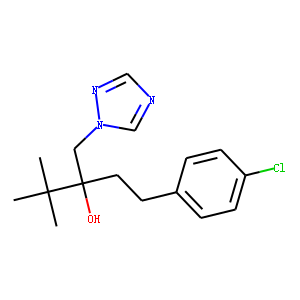| Reference | 1. Chemosphere. 2019 Sep;230:519-526. doi: 10.1016/j.chemosphere.2019.05.122. Epub
2019 May 15.
<br>
Pubertal exposure to tebuconazole increases testosterone production via
inhibiting testicular aromatase activity in rats.
<br>
Chen X(1), Zhu Q(1), Li X(1), Huang T(1), Wang S(1), Wang Y(1), Chen X(1), Lin
Z(1), Ge RS(2).
<br>
Author information:<br>
(1)Department of Anesthesiology, The Second Affiliated Hospital and Yuying
Children’s Hospital of Wenzhou Medical University, Wenzhou, Zhejiang, 325027,
China.<br>
(2)Department of Anesthesiology, The Second Affiliated Hospital and Yuying
Children’s Hospital of Wenzhou Medical University, Wenzhou, Zhejiang, 325027,
China. Electronic address: [email protected].
<br>
Tebuconazole is a triazole compound used agriculturally to treat plant
pathogenic fungi. However, whether pubertal exposure to tebuconazole affects
Leydig cell development remains unknown. Here, we exposed male Sprague-Dawley
rats at 35 days of age to 0, 25, 50, or 100 mg kg-1 day-1 tebuconazole for 21
days. Tebuconazole exposure increased serum testosterone level but lowered
estradiol level at a dose of 100 mg kg-1, without affecting serum luteinizing
hormone and follicle-stimulating hormone concentrations. Tebuconazole
up-regulated the expression of testicular Cyp11a1, Hsd11b1, and Fshr genes as
well as their proteins at a dose of 100 mg kg-1. However, tebuconazole did not
stimulate the proliferation of Leydig cells. Tebuconazole in vitro inhibits
aromatase activity in primary rat Leydig cells with IC50 value of 40 μmol/L. In
conclusion, tebuconazole exposure stimulates pubertal Leydig cell
differentiation via inhibiting aromatase activity.
<br><br>
2. Environ Pollut. 2019 Jun;249:1049-1059. doi: 10.1016/j.envpol.2019.03.067. Epub
2019 Mar 27.
<br>
Endocrine disrupting effects of tebuconazole on different life stages of
zebrafish (Danio rerio).
<br>
Li S(1), Sun Q(2), Wu Q(2), Gui W(3), Zhu G(2), Schlenk D(4).
<br>
Author information:<br>
(1)Institute of Pesticide and Environmental Toxicology, Zhejiang University,
Hangzhou, 310058, PR, China; Department of Environmental Sciences, University of
California, Riverside, CA, 92521, United States.<br>
(2)Institute of Pesticide and Environmental Toxicology, Zhejiang University,
Hangzhou, 310058, PR, China.<br>
(3)Institute of Pesticide and Environmental Toxicology, Zhejiang University,
Hangzhou, 310058, PR, China. Electronic address: [email protected].<br>
(4)Department of Environmental Sciences, University of California, Riverside,
CA, 92521, United States.
<br>
Tebuconazole is a widely used fungicide that has been detected in water
ecosystems, of which the concentrations may affect the endocrine function of
aquatic organisms. At present study, tissue-specific bioaccumulation of
tebuconazole was found in ovary of adult zebrafish, indicating a potential risk
of endocrine disruption. In order to evaluate the potential endocrine disrupting
effects, three life stages (2 hpf (hours post-fertilization) -60 dpf (days
post-fertilization), Stage I; 60-120 dpf, Stage II; 180-208 dpf, Stage III) of
zebrafish (Danio rerio) were chronically exposed to tebuconazole at the
concentrations ranging from 0.05 mg/L to 1.84 mg/L. Result showed that exposed
to tebuconazole could lead to a male-biased sex differentiation in juvenile
zebrafish and significant decrease of the percentage of germ cells in
sexually-mature zebrafish. Egg production was significantly inhibited by 57.8%
and 19.2% after Stage II- and Stage III-exposures, respectively. The contents of
17β-estradiol in gonad decreased by 63.5% when exposed to 0.20 mg/L tebuconazole
at Stage II and by 49.5% after exposed to 0.18 mg/L tebuconazole at Stage III,
respectively. For all stages exposure, reductions in 17β-estradiol/testosterone
ratio were observed, indicating an imbalance in steroids synthesis.
Additionally, tebuconazole reduced the expression of cyp19a, which was
consistent with the decrease of E2 level. In overall, the present findings
indicated that, playing as an anti-estrogen-like chemical, tebuconazole
inhibited the expression of Cyp19, thereby impairing steroid hormones
biosynthesis, leading to a diminished fecundity of zebrafish.
<br><br>
3. Aquat Toxicol. 2019 Jun;211:116-123. doi: 10.1016/j.aquatox.2019.04.002. Epub
2019 Apr 3.
<br>
Parental exposure to tebuconazole causes thyroid endocrine disruption in
zebrafish and developmental toxicity in offspring.
<br>
Li S(1), Wu Q(1), Sun Q(1), Coffin S(2), Gui W(3), Zhu G(1).
<br>
Author information:<br>
(1)Institute of Pesticide and Environmental Toxicology, Zhejiang University,
Hangzhou 310058, PR China.<br>
(2)Environmental Sciences, College of Natural and Agricultural Sciences,
University of California at Riverside, 900 University Avenue, Riverside, CA
92521, United States.<br>
(3)Institute of Pesticide and Environmental Toxicology, Zhejiang University,
Hangzhou 310058, PR China. Electronic address: [email protected].
<br>
Azole fungicides are one class of the most extensively applied current-use
pesticides. Tebuconazole is a common azole fungicide that has been frequently
detected in aquatic ecosystems, thus raising concerns about its ecological
safety. However, adverse effects of tebuconazole remain largely unknown,
especially with regard to endocrine function in aquatic organisms. In the
present study, sexually immature zebrafish were exposed to different
concentrations of tebuconazole (0.05, 0.20 and 0.50 mg/L) for 60 days in order
to test for transgenerational toxicity on the thyroid endocrine system. Thyroid
hormone homeostasis, neuronal, and cardiovascular development were investigated
in the F1 generation, which were reared in tebuconazole-free water. In the F0
generation, exposure to 0.20 and 0.50 mg/L tebuconazole reduced both thyroxine
(T4) and 3,5,3′-triiodothyronine (T3) levels in females, while the T3 levels
were unchanged in males. Decreased heart rate was found in F1 larvae, as well as
diminished T4 levels in F1 eggs/larvae. We also observed significantly increased
expression of ugt1ab mRNA in two generations of zebrafish. Moreover, expression
of mRNA associated with neuronal development (e.g. α1-tubulin, mbp, gap43) and
cardiovascular development (e.g. cacna1ab, tnncal) were significantly
downregulated in F1 larvae at 5 and 10 dpf. In addition, tebuconazole was
detected in F1 eggs following parental exposure, indicating maternal transfer.
This study demonstrated that tebuconazole can be transferred to offspring from
exposed parents, causing thyroid endocrine disruption and developmental
toxicity.
<br>
|

